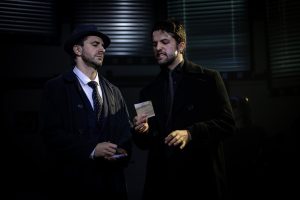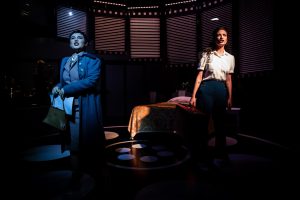Hayes Theatre, June 27
8/10
Gunshots ring out in a pitch-black theatre. We, the audience, might well be suspects rather than mere witnesses, so perverse is the reality of City of Angels, a 1989 musical about a writer adapting his detective novel into a screenplay, the resultant film being enacted side by side with events in his life as he writes. It lovingly satirizes every film noir cliche, and does it with such sharp-edged lines as could leave scars in the walls of the Hayes Theatre before the season is out.

The show holds a mirror up to itself that keeps cracking and cracking, until the fictional detective, Stone (Aaron Tsindos), is arguing with his own creator, Stine (Glenn Hill) about the way the plot is being bastardised by the film’s director, Buddy (Paul Hanlon). It’s as ingenious and crazy as it is funny, all the while mercilessly mocking the Hollywood way.
Written by Larry Gelbart (book), Cy Coleman (music) and David Zippel (lyrics), and despite critical acclaim and a slew of awards, the show never became the monster hit it deserves. Perhaps that is partly thanks to its Wagnerian length. An unfortunate audience member suffered a health concern on opening night, stretching the running time to three-and-a-quarter hours – yet the laughs kept coming.
Director/choreographer Sam Hooper (for Joshua Robson Productions) and designer Simon Greer have not only managed to fit a seven-piece band and 16 performers on the modest Hayes stage, they do it so we readily discern film action (enacted as Stine types the lines) from “real life” – until that line dissolves into zaniness.

Tsindos is a riot as the straight-faced Stone with his mordant wit, as is Hanlon as the overbearing, casting-couch-loving Buddy. Hill just about makes us like the comparatively wet Stine, and Penny McNamee has a ball playing Alaura, the film noir femme fatale. But the whole cast excels, with the singing especially strong as they nail tongue-twisting phrasing and challenging, jazzy melodies. The band, however, led by Abi McCunn and Damon Wade, seemed slightly under-rehearsed by comparison.
To free up stage space, Greer’s set primarily consists of mood-establishing venetian blinds, while James Wallis’s lighting is as sharp as Zippel’s lyrics. See this. It’s dizzyingly clever, and comes within a whisker of sustaining its extravagant length.